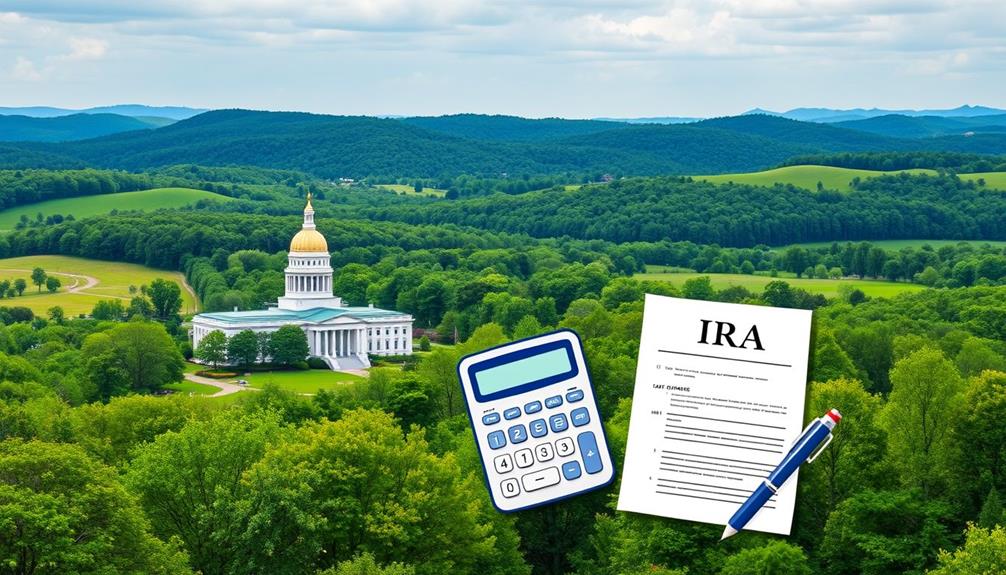In South Carolina, IRA withdrawals may be subject to state income tax, with rates reaching up to 6.5% for high earners. Individuals under 65 can take a deduction of $3,000 from their retirement income, while those 65 and older can deduct up to $10,000. Social Security benefits are not included in state income tax calculations, offering further financial assistance. It is crucial to comprehend these deductions and tax rates for successful retirement planning. Taking advantage of tax benefits can boost your retirement income. Stay tuned for more tips and advice on handling your retirement taxes efficiently.
Key Takeaways
- Traditional IRA withdrawals are subject to South Carolina state income tax, with rates up to 6.5% for high earners.
- Seniors (65+) can deduct up to $10,000 from their taxable retirement income, including IRA withdrawals, reducing tax liability.
- Individuals under 65 can deduct the first $3,000 of retirement income from taxable income, offering additional tax relief.
- Social Security benefits are fully exempt from state income tax, enhancing disposable income for retirees in South Carolina.
- Consulting a financial advisor can help retirees effectively navigate tax strategies related to IRA withdrawals and other retirement income.
Overview of South Carolina Taxes

When it comes to taxes in South Carolina, you'll find a progressive income tax system that can impact your retirement withdrawals. The state income tax rates range from 0% to 7%, with the top rate hitting income over $16,040. This means that your IRA withdrawals, considered retirement income, will be partially taxable under this system.
However, if you're 65 or older, you can deduct up to $10,000 from your taxable retirement income, which includes those IRA withdrawals. This tax break can greatly ease your financial planning as you navigate your retirement years.
Another positive aspect of South Carolina's tax structure is that Social Security benefits are fully exempt from state income tax. This exemption enhances the overall tax-friendliness for retirees, allowing you to keep more of your hard-earned money.
Additionally, the average effective property tax rate in South Carolina is around 0.57%, one of the lowest in the nation.
With these considerations in mind, understanding the state's tax implications can help you make informed decisions about your retirement income and financial planning strategies.
IRA Withdrawals and State Tax

When you withdraw from your traditional IRA in South Carolina, be aware that state income tax applies, and rates can reach up to 6.5% for higher income levels.
If you're 65 or older, you can take advantage of a $10,000 deduction on your retirement income, including IRA withdrawals.
For those under 65, the first $3,000 of retirement income is deductible, offering some relief on your tax bill.
Tax Treatment Overview
Maneuvering the tax treatment of IRA withdrawals in South Carolina can notably impact your retirement income. When you take distributions from a traditional IRA, those amounts are regarded as retirement income taxable under South Carolina income tax rates, which range from 0% to 6.5%.
However, if you've opted for a Roth IRA and meet specific conditions, such as keeping the account open for at least five years, those distributions can be tax-free.
For retirees aged 65 and older, South Carolina provides a tax exemption of up to $10,000 on retirement income, which includes your IRA distributions. This deduction can considerably reduce your taxable amount, especially if your total income stays under $10,000, exempting you from state income tax altogether.
It's essential to evaluate how your combined income levels affect your adjusted gross income (AGI) because higher IRA withdrawals can push you into a higher income tax bracket within the state's progressive tax system.
Age-Based Deductions
Understanding age-based deductions can greatly enhance your strategy for managing IRA withdrawals in South Carolina. If you're under 65, you can deduct up to $3,000 of retirement income, including your IRA withdrawals, from your taxable income. This can considerably reduce your state income tax liability, especially since the top income tax rate for IRA withdrawals is currently 6.5%.
However, if you're 65 or older, you'll benefit even more. Seniors can deduct up to $10,000 from their retirement income, which includes distributions from IRAs. This higher deduction provides essential financial relief, allowing you to stretch your retirement resources further.
It's important to remember that while IRA withdrawals are subject to state income tax, you can also enjoy the benefit of fully exempt Social Security benefits in South Carolina.
This dual advantage can enhance your overall retirement income strategy. By effectively utilizing these age-based deductions, you can minimize your tax burden and make the most of your IRA withdrawals, ensuring a more comfortable retirement in the Palmetto State.
Deductions for Retirement Income

In South Carolina, retirees can take advantage of substantial deductions for retirement income, including IRA withdrawals. If you're 65 or older, you can claim a $10,000 deduction on your total retirement income, which includes those IRA distributions. For individuals under 65, a $3,000 deduction applies.
While IRA withdrawals are partially taxable under South Carolina tax laws, these deductions help reduce your adjusted gross income (AGI), potentially lowering your state income tax burden.
It's important to note that Social Security benefits are exempt from state income tax, allowing you to maximize your disposable income alongside your IRA withdrawals. If your total income falls below $10,000, you're not subject to state income tax, which might mean tax-free IRA withdrawals for some retirees in South Carolina.
To navigate these deductions effectively, consider consulting a financial advisor who can help you understand how to leverage these retirement income exemptions best.
Social Security Tax Exemptions

In South Carolina, you won't pay state income tax on your Social Security benefits, which can considerably boost your retirement finances.
This exemption allows you to subtract those benefits from your adjusted gross income, giving you more disposable income.
As a retiree, this tax-friendly policy makes living on Social Security alone much more feasible.
Exemption Overview
South Carolina's tax policy offers a notable advantage for retirees by exempting Social Security benefits from state income tax. This exemption means you can subtract your Social Security income from your adjusted gross income (AGI), greatly reducing your state tax liability.
For many retirees, especially those relying heavily on Social Security as their primary source of retirement income, this policy provides essential financial relief.
The exemption applies to all retirees, making South Carolina an appealing choice for seniors looking to stretch their retirement dollars. If your total income is under $10,000, you won't pay any state income taxes, which is a considerable benefit for low-income retirees.
This exemption, coupled with other deductions for retirement income, positions South Carolina as one of the more tax-friendly states for seniors.
Impact on Retirees
Retirees in South Carolina enjoy a significant financial boost thanks to the state's exemption of Social Security benefits from state income tax. This exemption enhances your disposable income, making it easier to live comfortably in retirement. If your total income is under $10,000, including Social Security, you won't pay any state income taxes, providing additional relief.
Here's a quick look at the tax benefits:
| Tax Benefit | Details |
|---|---|
| Social Security Tax Exemption | Fully exempt from state income tax |
| Income Under $10,000 | No state income taxes |
| Senior Deduction | $10,000 deduction on other retirement income for seniors aged 65 and older |
This combination of Social Security tax exemptions and additional deductions for retirement income makes South Carolina a tax-friendly state for retirees. With lower South Carolina income tax rates and reduced income taxes in retirement, you can maximize your adjusted gross income (AGI) from retirement accounts. Additionally, this favorable tax environment can also ease your property tax retirement income obligations, allowing you to enjoy your golden years with financial peace of mind.
Property Tax Benefits for Seniors

For seniors aged 65 and older, South Carolina offers valuable property tax benefits that can greatly ease financial burdens. One of the most notable advantages is the Homestead Exemption, which allows you to exempt the first $50,000 of your home's value from property taxes. This exemption can considerably reduce your overall tax burden and provide much-needed financial relief during retirement.
With the average effective property tax rate in South Carolina at only about 0.57%, which is lower than the national average, you can enjoy additional savings as a homeowner. To apply for the Homestead Exemption, simply visit your County Auditor's Office, ensuring you've lived in your primary residence for at least one year.
Moreover, South Carolina offers additional property tax relief programs for low-income seniors, making it easier to manage housing costs.
It's also worth noting that there are no estate or inheritance taxes in the state, allowing you to preserve your wealth without extra tax burdens.
These property tax benefits are essential for seniors looking to maximize their financial resources during retirement.
Comparing Retirement Taxes by State

When it comes to retirement taxes, understanding how different states treat your income is essential for effective financial planning.
South Carolina's approach to taxing IRA withdrawals includes considering them as part of your taxable income, but it does offer a $10,000 deduction for seniors aged 65 and older on retirement income. This can ease the burden, especially when compared to states like Florida, where IRA distributions aren't taxed at all.
You'll find that South Carolina doesn't tax Social Security benefits, which is a plus, while states like Pennsylvania do tax both Social Security and IRA withdrawals.
If you're considering Georgia, note that they allow a deduction of up to $65,000 for seniors, making their treatment of retirement income considerably more favorable than South Carolina's capped deduction.
South Carolina Income Tax Structure

Understanding South Carolina's income tax structure is essential for anyone planning their financial future in the state. South Carolina employs a progressive income tax system with six brackets, which impacts your adjusted gross income (AGI) after IRA withdrawals. The top income tax rate is 6.5% for those earning over $16,040 starting in the 2024 tax year.
Here's a quick look at how retirement income and other factors influence your state income taxes:
| Income Level | Tax Rate |
|---|---|
| Up to $3,200 | 0% |
| $3,201 – $16,040 | 3% |
| $16,041 – $30,000 | 4% |
| Over $30,000 | 5% to 6.5% |
Retirees under 65 can deduct $3,000 from their retirement income, while seniors 65 and older can deduct up to $10,000. Importantly, Social Security benefits are fully exempt from state income tax, making South Carolina an attractive option for retirees. Additionally, if your total income is under $10,000, you won't pay any state income taxes at all, providing significant relief for low-income seniors.
Sales Tax Considerations for Retirees

Sales tax in South Carolina plays a significant role in how retirees manage their finances. The state's sales tax rate is 6%, with localities adding up to 3%, leading to an average combined sales tax rate of about 7.5%. For retirees on fixed incomes, understanding these rates is vital for budgeting.
Fortunately, essential items like groceries are exempt from sales tax, providing financial relief for those who need to stretch their budgets. This exemption allows retirees to allocate more of their limited resources toward other necessary expenses.
However, not all items enjoy this benefit. Clothing, women's menstrual products, and diapers are subject to sales tax, which can impact your overall spending.
Moreover, retirees often rely on prescription drugs for their healthcare needs. Thankfully, these medications are also exempt from sales tax in South Carolina, further easing financial burdens on retirees.
Financial Planning Resources in SC

As you traverse retirement in South Carolina, you'll find a wealth of financial planning resources designed to help you make informed decisions. The state offers various online matching tools to connect you with financial advisors who can provide tailored advice on the tax implications of IRA withdrawals.
With South Carolina's favorable tax treatment of Social Security benefits and retirement income, these resources become invaluable.
You can also take advantage of educational seminars and workshops hosted by local community centers and financial institutions. These events focus on traversing retirement income tax strategies specific to South Carolina, giving you the knowledge to optimize your financial situation.
Additionally, the South Carolina Department of Revenue provides informational resources and publications that clarify your tax obligations regarding IRA withdrawals and other retirement income.
Many local financial planning firms offer free consultations, allowing you to assess your overall financial picture without any commitment.
Frequently Asked Questions
Does South Carolina Tax IRA Withdrawals?
Yes, South Carolina does tax IRA withdrawals. The state imposes income tax on these distributions, but you may qualify for deductions based on your age and total retirement income, which can reduce your taxable amount.
Do You Pay State Taxes on IRA Withdrawals?
Yes, you do pay state taxes on IRA withdrawals. The rate varies depending on your income level, but remember, there are deductions available for retirees that can help lower your taxable income considerably.
What Is the Tax Exclusion for Retirement in South Carolina?
In South Carolina, you can exclude up to $10,000 of retirement income from taxes if you're 65 or older. If you're younger, you can exclude $3,000, helping reduce your overall tax burden considerably.
What Is the Income Tax Break for Seniors in South Carolina?
Imagine enjoying your golden years without hefty state taxes. In South Carolina, you'll benefit from a $10,000 retirement income deduction if you're 65 or older, easing your financial burden and enhancing your retirement experience.
Conclusion
In summary, understanding the state tax implications of IRA withdrawals in South Carolina can greatly impact your retirement planning. With potential deductions and exemptions, you can keep more of your hard-earned money. As you navigate these tax considerations, ask yourself: wouldn't it be nice to enjoy your retirement without worrying about excessive taxes? By staying informed and utilizing available resources, you can make the most of your retirement years in the Palmetto State.









